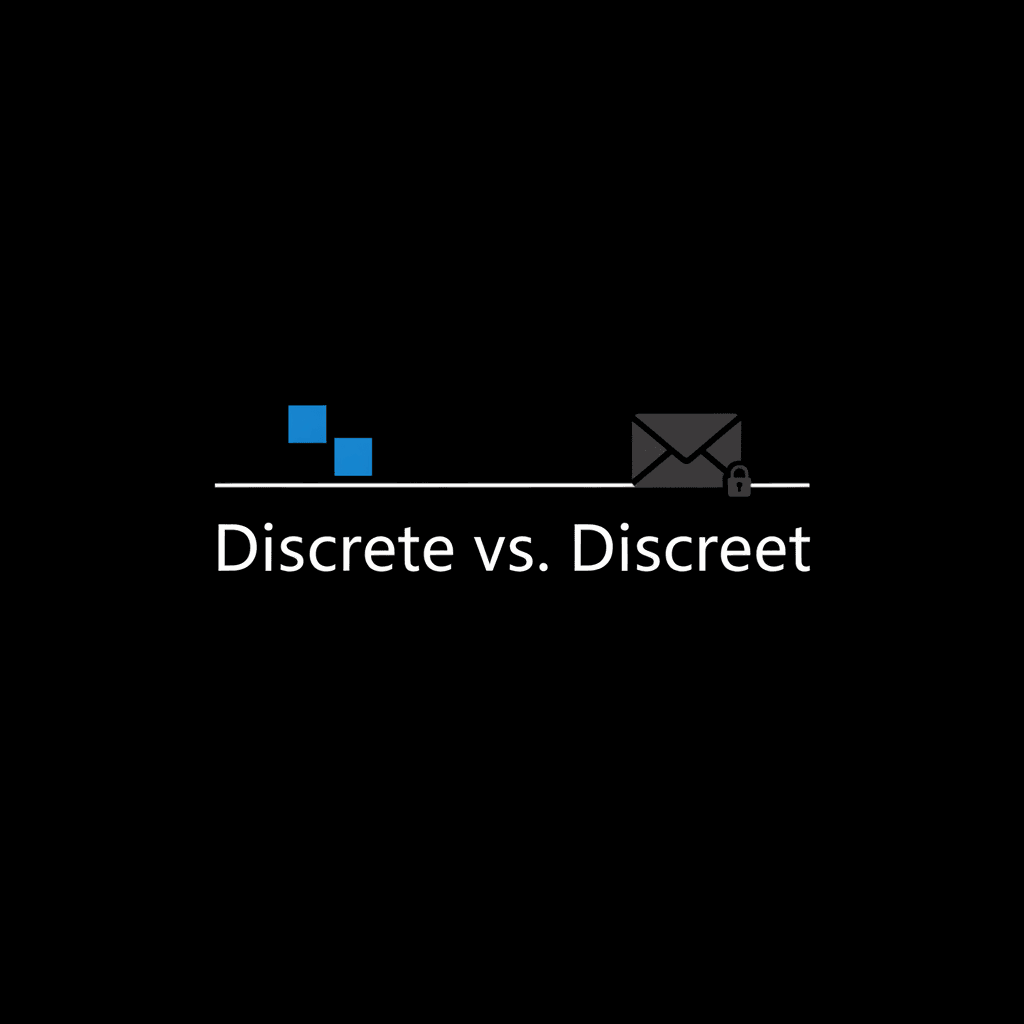Discrete vs. Discreet: What’s the Difference?
 Although discrete and discreet sound the same, they have different meanings and uses in English.
Although discrete and discreet sound the same, they have different meanings and uses in English.
Here’s the quick rule:
- Discrete → separate, distinct, individual.
- Discreet → careful, private, or modest.
Let’s explore both in detail.
1. Discrete: Separate or Distinct
Meaning
“Discrete” means separate, individual, or distinct — things that are clearly different or not connected.
It’s commonly used in math, science, and technology, but also in everyday English.
Examples (10 total)
- The report divides data into discrete categories.
- The company has discrete departments for marketing and sales.
- Each sound is stored as a discrete digital unit.
- The teacher grouped students into discrete skill levels.
- They treated the two issues as discrete problems.
- The sensors measure discrete temperature changes.
- The islands form discrete land masses.
- Data is broken into discrete packets for transmission.
- The painting uses discrete blocks of color.
- These are discrete steps in the process, not one continuous action.
🧠 Tip:
If it means “separate” or “distinct”, use discrete.
2. Discreet: Careful or Private
Meaning
“Discreet” means careful, tactful, or showing good judgment — especially about keeping secrets or avoiding embarrassment.
It’s often used to describe people or behavior.
Examples (10 total)
- Please be discreet about this matter.
- He made a discreet exit from the meeting.
- They had a discreet conversation in the hallway.
- She’s very discreet about her personal life.
- The detective was discreet in his questioning.
- Be discreet when handling sensitive information.
- He gave a discreet nod of approval.
- The journalist was discreet about her sources.
- They arranged a discreet meeting at the café.
- I trust her because she’s always discreet.
🧠 Tip:
If it means “careful” or “private”, use discreet.
3. Quick Comparison Table
| Word | Meaning | Common Context | Example |
|---|---|---|---|
| Discrete | Separate, distinct, individual | Science, math, logic | The data points are discrete values. |
| Discreet | Careful, private, tactful | Personal behavior, communication | She was discreet about their relationship. |
4. How to Remember the Difference
👉 Discrete → Think of “separate E’s” (notice the space between the two e’s).
👉 Discreet → Think of “two e’s together” — like two friends who keep secrets (private).
💡 Memory Trick:
Discreet people keep things secret — they rhyme!
5. Common Mistakes
❌ He was very discrete about his private life.
✅ He was very discreet about his private life.
❌ The data was divided into discreet groups.
✅ The data was divided into discrete groups.
6. Why It’s Easy to Mix Them Up
They’re homophones — they sound exactly the same (/dɪˈskriːt/).
The difference only shows up in writing, not pronunciation.
Even experienced writers sometimes mix them up, but tools like Humanizey can help ensure you always choose the right one in context.
FAQs
1. Is “discreet” a positive word?
Yes. It suggests good judgment, politeness, and respect for privacy.
2. Can “discrete” be used in everyday English?
Yes, but it’s more common in academic or technical contexts.
3. Are “discreet” and “secretive” the same?
Not exactly. “Discreet” means careful and respectful, while “secretive” can sound sneaky or suspicious.
4. What’s “discrete math”?
It’s a branch of math dealing with separate values (like integers or graphs) rather than continuous ones.
Practice: Choose the Correct Word (“Discrete” or “Discreet”)
(Answers are listed at the end.)
- Please be ___ when talking about the surprise party.
- The two systems operate as ___ units.
- She gave him a ___ smile across the room.
- The study analyzed ___ data sets.
- He made a ___ gesture to signal me.
- Each file is stored in a ___ location.
- You should be ___ when discussing client details.
- The robot performs ___ tasks in sequence.
- They prefer to keep their donations ___ from the public.
- These are ___ events, not connected in time.
Answers
- discreet
- discrete
- discreet
- discrete
- discreet
- discrete
- discreet
- discrete
- discreet
- discrete
